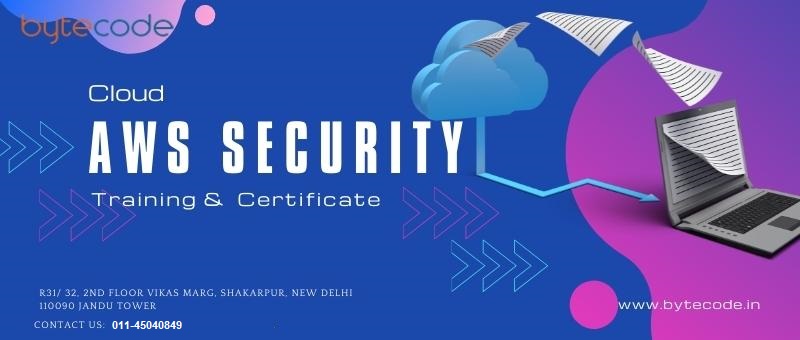Best AWS Security Certification Training
The Security Engineering on AWS Security training course helps you build extensive knowledge to keep yourself secure in the AWS Cloud using AWS security services. The training encompasses the recommended security practices by AWS Security along with security practices, and security features of AWS key services including compute, storage, networking, and database services. Learnings concerning AWS services and tools for automation, continuous monitoring with logging, and responding to security incidents.

What is AWS Security?
The various tactics and procedures that Amazon Web Services (AWS) has implemented to protect the cloud infrastructure, information, and apps that are hosted on its platform are collectively referred to as AWS Security. This covers a range of security controls that are used to stop data loss, illegal access, and other potential security risks. These encompass measures pertaining to operating protocols, software systems, and physical infrastructure.
Furthermore, a variety of security protections are offered by Amazon Web Services (AWS). These include using the Amazon Virtual Private Cloud (VPC) to enforce network isolation, allowing secure access to instances, encrypting data while it’s in transit and at rest, and utilizing identity and access management (IAM) to restrict access to AWS services.
Additionally, AWS clients are in charge of ensuring the security of their own apps and data housed on the platform by adhering to predetermined security and compliance guidelines. The procedure for configuring security, installing security updates, and conducting routine monitoring to identify potential security risks are all included in the system.
Students can attend classes from their homes. It takes less time to attend an online class. At the same time, various groups can attend online classes with bytecode Cyber Security From home.
AWS Security Course Module
MODULE 01: Given an AWS Abuse Notice, Evaluate a Suspected Compromised Instance or Exposed Access Key
MODULE 02: Evaluate the Configuration of Automated Alerting and Execute Possible Remediation of Security-Related Incidents and Emerging Issues
MODULE 03: Verify that the Incident Response plan includes relevant AWS services
MODULE 04: Design and implement security monitoring and alerting
MODULE 05: Troubleshoot security monitoring and alerting
MODULE 06: Design and Implement a Logging Solution
MODULE 07: Troubleshoot Logging Solutions
MODULE 08: Design Edge Security on AWS
MODULE 09: Design and implement a secure network infrastructure
MODULE 10: Design and Implement a Scalable Authorization and Authentication System to Access AWS Resources
MODULE 11: Troubleshoot a secure network infrastructure
MODULE 12: Design and implement host-based security
MODULE 13: Troubleshoot an Authorization and Authentication System to Access AWS Resources
MODULE 14: Design and implement a data encryption solution for data at rest and data in transit
MODULE 15: Troubleshoot key management
MODULE 16: Design and implement key management and use
What will you learn in AWS Security Certification Training?
The comprehensive AWS Security Certification Training in Delhi will provide hands-on training in real-world scenarios. Participants in this training program can have a better understanding of the ideas that are essential to their future jobs in cloud computing, as it covers essential courses on AWS security fundamentals. Active participation in all needed modules as outlined in the pertinent curriculum is expected of participants in the AWS security certification training program who demonstrate a desire to learn.
The AWS Security Certification Course is taught by a team of exceptionally skilled and knowledgeable professors. The course will be given by a highly qualified and diverse training professional with over 10 years of experience in training.
The AWS security specialist course or the security specialty course are options for individuals who wish to have a thorough understanding of cloud security technologies. After completing this comprehensive curriculum, students will be well-versed in the most recent information related to AWS security certification. This includes critical knowledge that can assist cloud associate professionals advance to more senior jobs within their company.
Learn Online AWS Security Certification Training
We are very aware of the concerns prospective students face when attempting to pursue a fantastic job in the esteemed sector of cloud security. One can gain a comprehensive understanding of the essential knowledge quotient that is included in the curriculum of the AWS security certification training by passing the online course on AWS security training.
Furthermore, you will get the opportunity to receive comprehensive and dynamic career guidance from Bytecode Security’s highly recognized cybersecurity expert, Mr. Mohit Yadav, who serves as a media panelist for over twelve major media outlets covering cybersecurity-related topics. Give our knowledgeable professionals a call at +91-9513805401 to schedule a demo session.
Best Institute for AWS Security Certification in Delhi
The official AWS Security Course curriculum seeks to provide committed students with essential knowledge and abilities that will greatly enhance their chances of landing a job as an AWS associate professional. People can improve their job profile in an IT organization’s hierarchical structure by gaining this skill.
Examining security features and practices related to major AWS services is just one of the many crucial components of the AWS security certification course. These services include a wide range of industries, including databases, networking, storage, and computer services. This inquiry is about learning more about AWS security certification training services and tools’ extra areas of expertise in order to automate tasks, monitor continuously through logging, and be able to handle security issues in an efficient manner.
To obtain training in cloud security, people can enroll in Bytecode Security, a well-known organization that provides extensive courses in India and other major nations throughout the world. For additional details, please give us a call at +91-9513805401.
Know Your Eligibility Criteria for AWS Certification Training
The AWS certification program’s eligibility conditions are unclear. However, prior familiarity with AWS or cloud computing is highly recommended to improve chances of passing the certification exam.
AWS offers suggested knowledge and expertise to assist individuals in getting ready for the certification tests associated with various AWS Associate certifications. Candidates for the AWS Certified Solutions Architect— Associate credential specify that they must have a basic understanding of networking, storage, and security fundamentals in addition to at least a year of practical experience using AWS services.
Anyone interested in studying AWS Security Certification Training should be aware of the eligibility requirements, which include holding a valid AWS Associate Certification and having at least 4 to 5 years of professional work experience as a cloud associate.
It’s also crucial to carefully go over the certification requirements and required credentials before beginning the training procedure. This can be done by going to the official AWS website or, for more help, giving our knowledgeable educational counselors a call at +91-9513805401.
Course Duration
- Course Duration: 40 Hours
- Course Level: Intermediate
- Included: Training Certificate
- Language: English, Hindi
- Course Delivery: Classroom Training
- Course pdf: Click here to Download
Who this AWS Security Training Course is for :
- Security engineers are interested in deploying applications on AWS Security.
- Any IT professional who wants to learn AWS security.
- Employees can pursue this security course.
- Beginners who want to understand the AWS Security course.
- Security architects.
What is new in the AWS Security Course?
- AWS shared a security responsibility model.
- Encryption techniques.
- Applying security checks to conduct an automated and reproducible infrastructure.
- Troubleshoot key management.
- Design and implement host-based security.
Our Students are placed in Companies




Our Google Reviews
Frequently Asked Questions
About Amazon Web AWS Security Course in Delhi
What does AWS use for security?
Many different security protocols are used by Amazon Web Services (AWS) to safeguard its cloud computing services. Virtual private clouds (VPCs), firewalls, identity and access management (IAM) regulations, and data encryption are some examples of these technologies. Other security services offered by Amazon Web Services (AWS) include AWS Inspector, which conducts security checks, and AWS Shield, which defends against DDoS attacks.
How many types of security are there in AWS?
The security features of Amazon Web Services (AWS) are divided into six categories. These topics include Network Safety, Application Security, Data Encryption and Protection, Identity and Access Management (IAM), Logging and Monitoring, and Infrastructure Security.
Does AWS have good security?
Data protection, identity and access management (IAM), multi-factor authentication (MFA), and encryption are just a few of the many security features that AWS provides. Furthermore, Amazon Web Services (AWS) offers a range of solutions to assist clients in safeguarding their data and applications against dangers like hostile entities and Distributed Denial of Service (DDoS) attacks.
Does AWS have firewall?
AWS Network Firewall is a managed service that makes it easy to deploy essential network protections for all of your Amazon Virtual Private Clouds (VPCs). AWS Network Firewall includes features that provide protection from common network threats.
What are the key benefits of AWS Security?
A person may consider enrolling in a reputable institution like Craw Cyber Security Institution, which has branches in Saket and Laxmi Nagar, after working for five to ten years as an AWS Associate in a cloud-based company. This company offers a comprehensive AWS Security Course, instructed by highly skilled and experienced professionals in the field.
How hard is AWS Security exam?
Exam-taking procedures don't provide a very high level of complexity. In my assessment, the level of complexity on this exam is slightly greater than associate-level exams, but significantly lower than professional-level exams. Furthermore, if you dedicate yourself entirely to it for a duration of around two months, you will gain a current and comprehensive understanding that will equip you for any pertinent work in the AWS Security domain.
Which is the hardest AWS Security certification?
In terms of difficulty, the three most challenging Associate-level AWS Certifications are the Developer, AWS Solution Architect, and SysOps Administrator certifications.
Furthermore, when referring to professionals, the title is known as the Solution Architect Professional.
Do AWS certifications expire?
AWS Certifications are valid for three years. To maintain your AWS Certified status, we require you to periodically demonstrate your continued expertise through a process called recertification.
What is the difference between an exam and a certification?
An exam is a test that validates an individual’s technical knowledge of AWS products and services. A certification is a credential that you earn upon successfully passing an exam. This credential is a digital badge and title that you may use on your business cards and other professional collateral to designate yourself as AWS Certified
How do I prepare for AWS security specialty ?
To pursue the AWS Certified Security - Speciality certification, you must first get the AWS Associate Certification. After that, it is expected that the candidate has a significant professional background spanning five to ten years as an accredited AWS Associate Professional working for a reputable IT company.
What are biggest AWS security vulnerabilities?
It has been demonstrated that the Amazon Web Services (AWS) infrastructure has several significant security vulnerabilities. These vulnerabilities are listed as follows:
- Unsecured Cloud Storage
- Unpatched Systems and Software
- Misconfigured Security Groups
- Insecure APIs
- Weak Identity and Access Management
- Exposed Credentials
- Unencrypted Data
What are the risks of AWS?
The following are the main risks connected to Amazon Web Services (AWS):
- Security Risks: While Amazon Web Services (AWS) offers a dependable and secure platform, it is important to keep in mind that customers are ultimately responsible for ensuring the security of their own systems and data. Users using AWS are entirely responsible for safeguarding their apps and data, as well as for ensuring that their configurations adhere to recognized security best practices.
- Data Loss Risks: Data protection and backup are the responsibility of AWS customers, who also need to take the appropriate safety measures to safeguard their data. Users must take security procedures to guard against potential data loss because AWS cannot guarantee the security of client data.
- Cost Risks: Customers of Amazon Web Services (AWS) are responsible for managing their own cloud expenses and can incur additional fees if their usage goes over what they had anticipated.
- Compliance Risks: It is the responsibility of AWS customers to make sure that their apps and data comply with all relevant laws and regulations. Amazon Web Services (AWS) provides customers with a variety of resources and assistance to help them fulfill their legal requirements. However, to ensure that they are following compliance standards, customers must take the appropriate actions.
Does AWS provide a firewall?
The Intrusion Prevention System (IPS), also referred to as the AWS Network Firewall, provides dynamic network flow inspection to detect and prevent the exploitation of vulnerabilities through signature-based detection.
Furthermore, AWS Network Firewall has web filtering capabilities that effectively restrict traffic to known dangerous URLs and enable fine-grained management over fully qualified domain names.





























